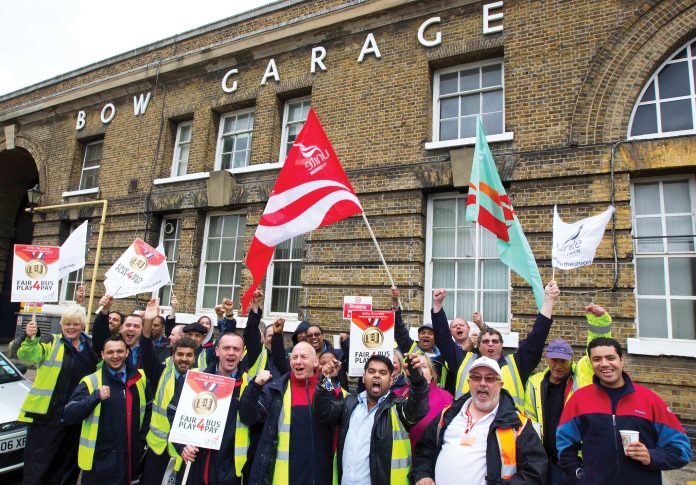With transport workers striking up and down the country, including in the historic RMT rail strike starting on 21 June, Andy Beadle, a former London bus driver and union rep, looks back at the huge London bus strike that hit the city ten years ago this month.
It is a decade since the great bus strike of 2012 – the first all-London one since privatisation in the mid-1990s.
Bus bosses were astonished when workers decided enough was enough and brought the capital to a standstill.
In September 2011, Unite the union officers gave Transport for London (TfL) 12 months’ notice that bus workers were demanding a £500 bonus for the extra work and stress we would be under during the 2012 London Olympic Games. We were not the only transport union to put in such a demand. But in the course of the next few months it did feel that we were the only ones to get a flat ‘no’ in response.
More exactly, we didn’t really get an answer. We were just ignored. TfL, the government regulator which allocated bus routes to the competing private operators, claimed it had nothing to do with them. It advised Unite to go and speak to the 20 private companies individually. Months went by and nothing was heard.
The following summer, at Battersea Depot where I worked, a letter was attached to the company notice board. It was from the managing director of Abellio. It was an expression of deep regret, but there’d be no bonus. No doubt drivers in other firms got similar messages. It was a deliberate snub that firms didn’t reply directly to Unite, but it was the first sign that Unite’s decision to ballot its drivers might be causing some concern.
A big majority of bus drivers were in the union, but there was widespread scepticism that a strike would really happen. But alongside this doubt, born out of long experience, was a growing sense of frustration at the injustice. Why was everyone else getting a bonus but not us? Naturally the tube workers had a good deal: they had a strong union led by Bob Crow. From the Docklands Light Railway, to airport staff, unions had agreed bonuses – some of them more than we were even asking for.
With two weeks to go, Unite’s regional secretary, Peter Kavanagh, spoke to a meeting of London bus shop stewards. 94% had voted in favour of action, and an official 24-hour strike was announced to start at 3am on 22 June. Still there was doubt, but that mood was changing rapidly among bus drivers.
A roadside controller knew he’d be expected to drive a bus on strike day, along with other management, “but the first abuse I get, I’ll be chucking my passengers off and calling to say I’m bringing my bus back to the depot on health and safety grounds.”
London mayor Boris Johnson, thinking of his future career, did a U-turn (fancy that!). He said £8.3 million was available towards our demands. TfL said that meant every driver at a garage where one or more of its routes was deemed to be affected would receive £500. That was provided they worked throughout the 29 days of the Olympic and Paralympic Games!
This offer showed the desperate haste and panic of Johnson and TfL at this stage. Unite pointed out it wasn’t even legal: bus drivers are not allowed to work more than 13 consecutive days before a 24-hour break.
If Johnson hoped that the private operators would contribute to the deal, he was disappointed. They understood this fight wasn’t just about a one-off bonus. If they conceded, what other demands would follow? They warned if the strike went ahead, Johnson’s £8.3 million could be withdrawn. A High Court judge granted an injunction to three of the 20 bus firms to prevent their workers striking.
Strike day came and it was brilliant! Seventeen bus firms were in the strike. We weren’t sure what the turnout on the picket lines would be or how many workers would cross them. We needn’t have worried. London has around 80 bus depots and at the big ones, noisy, excited picket lines of 70, 80 or more were typical.
85% of London’s entire fleet was off the road that day. As shift workers, a picket line is the only time we see all our workmates together. At Battersea, seventy drivers joined or rejoined the union, 34 of them on strike day itself.
Peter Hendy, Commissioner for Transport at TfL, pronounced the strike “reprehensible”. But one day of strike action was enough to send TfL scurrying around with big bus bosses to concede almost everything that had been ‘impossible’ the day before. Unite took steps to involve coworkers barred by injunctions next time. Unite had set dates for two follow-up strikes but they became unnecessary. Within days Unite received an offer which was balloted on by members.
The deal meant every full-time driver got at least £500 before tax and part-timers pro rata. 71% voted to accept the deal. This was a clear victory.
This struggle and the strikes three years later, again of a London-wide scale, showed the power of bus workers when they take action together. This is needed again now as London bus drivers, like all workers, face the cost-of-living squeeze at the same time as Labour Mayor Sadiq Khan has shown that he is incapable of standing up to Tory cuts to the TfL budget. Therefore, it is essential that Unite demands the renationalisation of the London bus companies with drivers on the same but best rates of pay, pensions and terms and conditions as part of a publicly owned transport network in the capital. It is vital that the union joins with the other transport unions, particularly the RMT whose members have already shut down the tubes once this year and are going out again.







